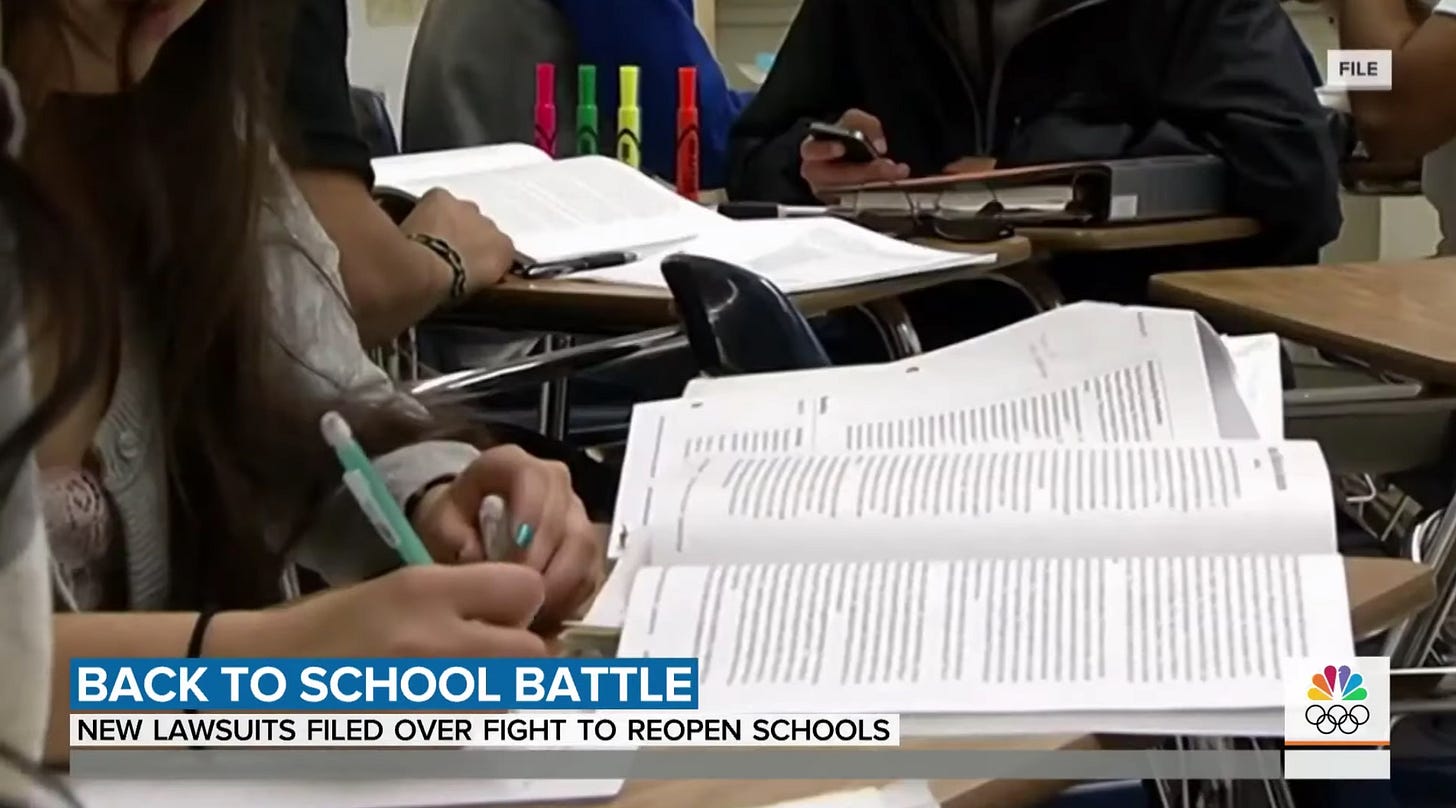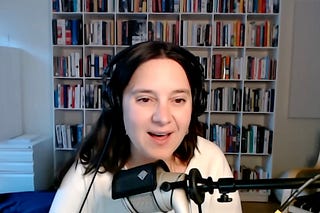
Don't Be Mad at Teachers for Not Wanting to Die
The hysteria around school reopenings is out of control.
We've now entered the phase of the pandemic where conservatives who've been screaming for states to "reopen" are joining hands with well-off liberals to call out the real villains in all of this: teachers' unions.
There's examples of this out there in terms of policy, local punditry, and national political reporting in which the issue is framed as a political fight framing the fight as one between Democrats—whether it be mayors like Lori Lightfoot in Chicago or the White House—and interest groups. But the most recent, galling example is a long op-ed published Monday by Vox, in which Boston University epidemiologist Benjamin Linas makes the case that schools should reopen based on the very tenuous argument that they are now safe, or at least safe enough.
Linas, like a lot of parents, is frustrated. It's a frustrating situation for any parent to deal with—and lots of parents who also happen to be teachers are going through this, too. I haven't talked to, seen, or heard of a single teacher who wouldn't rather be in the classroom right now.
But Linas returns to the familiar "anti-science" argument we've seen since the beginning of the pandemic, which paints teachers' unions who want to keep their members safe as some sort of parallel equivalent to conservatives who want essential workers to die for the economy. The two are very much not the same.
Before getting into the merits here, let's look at the caseload we're dealing with. While national COVID cases have fallen fairly dramatically over the past few weeks, from a peak of more than 300,000 new cases on January 8 to 55,552 new cases on February 15, more than 55,000 new cases is still an enormous amount. Massachusetts is one of the better-off states (if you can call it that), but with all of the unknown factors involving new COVID variants, there's still plenty we do not know and valid reasons for concern.
Linas is fundamentally mad about this in two ways: one is as a parent, but the second is as a public health official apparently frustrated that teachers' unions have a say in this decision at all.
Linas writes that, though he is a volunteer member of a health and safety panel advising his local school district, the panel's advice "has been frequently dismissed by the local educators’ union in favor of their own judgments about best health practices and the safety of in-person learning. In the process, they have misinterpreted scientific guidance and transformed it into a series of litmus tests that keep our district in hybrid learning." One of these "litmus tests" is that teachers want social distancing guarantees of six feet apart. OK? Even if this is true, it's something we've been told we need to do since the beginning of the pandemic.
Linas cites studies from other countries conducted last year about safely reopening schools, a point that's so absurd—considering that other countries did not completely blow the pandemic to the extent that our government(s) did—that it's hardly worth mentioning. He cites studies from North Carolina and Wisconsin which found limited in-school spread, but the CDC published a paper in January finding that more than 5,700 cases associated with outbreaks in Wisconsin between September and November were linked to schools and child care facilities. Anecdotally, a Catholic high school in my city recently had to close for two weeks because of a cluster of COVID cases. We have conflicting evidence, and conflicting takes from public health experts. So it's not that simple.
And mentioned nowhere is the nearly 200 active teachers who've died from COVID-19 nationwide. Not every school has the same sort of ventilation, and not all cities, towns, and counties have the same rates of cases and community spreads—although one thing practically all of them have in common is that the rates are far too high.
Linas also criticizes his local teachers' union for not aligning with "current guidance" from the CDC and other agencies. But the guidelines released Friday by the CDC recommended full in-person learning only in areas that aren't seeing substantial community spread. According to CBS News, that standard would currently apply to just nine percent of students across the country. So at which point is the CDC wrong?
“We know that the amount of disease in the community is completely reflected as to what’s happening in school. If there’s more disease in the community, there will be more in school,” CDC director Dr. Rochelle Walensky said last week. “So, I would say this is everybody’s responsibility to do their part in the community to get disease rates down, so we can get our schools opened.”
As David Dayen pointed out at The American Prospect yesterday, the situation in Brookline versus your average public high school is very different, and the whole narrative about not reopening somehow being racist or classist ignores that white people are much more likely to demand schools reopen than Black or Latino parents.
But there's a dynamic here that goes beyond the pandemic which shouldn't be ignored: as much (relatively) friendly press as teachers and teachers' unions got within the past few years after a wave of strikes against decades of austerity, the fact remains that a lot of well-to-do people do not respect the job that teachers perform. Corey Robin wrote about this in 2012 and somehow I don't think the whole thing has changed in the last eight years:
It’s clear where the kids got it from: the parents. Every year there’d be a fight in the town over the school budget, and every year a vocal contingent would scream that the town was wasting money (and raising needless taxes) on its schools. Especially on the teachers (I never heard anyone criticize the sports teams). People hate paying taxes for any number of reasons—though financial hardship, in this case, was hardly one of them—but there was a special pique reserved for what the taxes were mostly going to: the teachers.
In my childhood world, grown ups basically saw teachers as failures and fuck-ups. “Those who can’t do, teach” goes the old saw. But where that traditionally bespoke a suspicion of fancy ideas that didn’t produce anything concrete, in my fancy suburb, it meant something else. Teachers had opted out of the capitalist game; they weren’t in this world for money. There could be only one reason for that: they were losers. They were dimwitted, unambitious, complacent, unimaginative, and risk-averse. They were middle class.
The problem liberal and conservative reopeners alike have with teachers' unions isn't that they're anti-science. It's that they're collectively advocating for their well-being, and that advocacy happens to be at odds with both the frustrations of some parents and the current thinking among liberal epidemiologists in one of the wealthiest towns in Massachusetts.
Everyone deserves a safe workplace: not just teachers but the janitorial and cafeteria staff, and bus drivers, and fast food and meatpacking workers, and manufacturing workers, and so on. Every worker deserves a union that will fight for their safety. Don't get angry at teachers who have that—be mad that everyone doesn't have it.






